Introduction
Amla, also known as Amalaki, is often referred to as the “nectar of life,” and for good reason. It has been valued for hundreds of years for its ability to boost the immune system, help with digestion, and keep skin and hair healthy. Full of vitamin C, antioxidants, and other important nutrients, this small, tangy fruit has surprising health benefits that go beyond its size. In this blog, we will learn more about the benefits of amla for hair and skin, its role in enhancing immunity and digestion, along with Ayurveda formulations that help us reap them most effectively.
About Amla
Amla (Emblica officinalis) is found around the Indian subcontinent, China, Taiwan, Sri Lanka, and Malaysia. It is said to have come from tropical Southeast Asia. It is a small to medium-sized tree that grows to be about 8 to 18 meters tall. Amla fruits are a good source of carbohydrates, providing over 70 g per 100 g of dry weight. Amla contains an abundance of vitamin C, fibre, protein, and minerals, including iron, calcium, and phosphorus, and vitamins A, B1, and E. Amla has about eight times more vitamin C than oranges and twice as many antioxidants as Acai berries. These nutrients are exactly what make amla beneficial for your health. They boost your immune system, aid digestion, and are beneficial for your skin and hair.
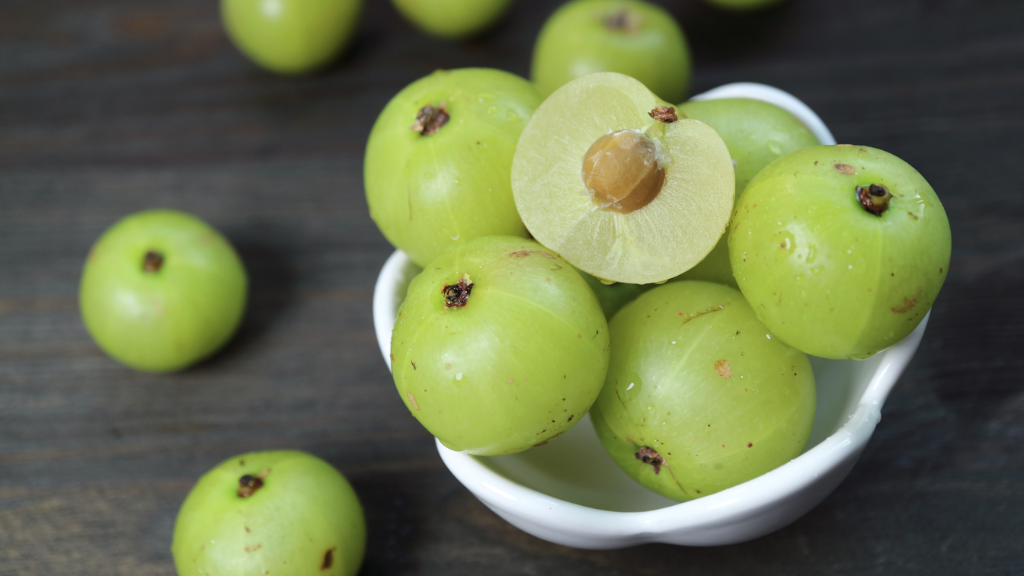
Amla is rich in antioxidants and various other phytochemicals, such as polyphenols, flavonoids, and tannins, all of which help to destroy free radicals and protect the body from oxidative stress. Different parts of the amla plant contain many beneficial compounds, including gallic acid, quercetin, and emblicanin A and B, that can protect and rejuvenate the body.
Studies suggest that these compounds may support your body’s natural defences by enhancing the activity of protective enzymes and other molecules, such as glutathione, catalase, and superoxide dismutase, that protect against damage to cells and tissues. The unique combination of nutrients (Vitamin C, iron, and calcium) and bioactive compounds found in amla provides a natural, time-tested way to support health and vitality.
Amla in Ayurveda
Ayurveda uses amla in a lot of its formulations; it is a known rejuvenator and has five of the six Ayurveda tastes: sweet, bitter, astringent, sour, and pungent. It helps with improving vision and is a strong aphrodisiac. Amla is tridoshahara, which means it balances all three doshas: Vata dosha, because it is sour, Pitta dosha, because it is sweet and cold, and Kapha dosha, because it is dry and astringent. This is why it is quoted as the best among fruits.
अम्लं समधुरं तिक्तं कषायं कटुकं सरं।
चक्षुष्यम् सर्वदोषघ्नं वृष्यमामलकीफलम् ।।
हन्ति वातं तत् अम्लत्वात् पित्तं माधुर्यशैत्यत:।
कफं रुक्षकषायत्वात् फलेभ्यो अभ्यधिकं च तत्।। ( Su. Su. 46/144)
It is a key ingredient of many Ayurveda medicines, such as Thriphala choornam, Chyawanprash, and Nisakathakadi kashayam. Because it is so good for your health, Amla is also called Dhathri, which means “mother.” Charakacharya called it the best rejuvenator and said that taking it regularly would help Ojas, or natural glow.
Amla's Health benefits
- Amla is full of important nutrients that are needed for good health and to fight many common diseases.
- Amla has vitamin C, which is a natural antioxidant that boosts the immune system and slows down ageing.
- It also helps the body make collagen, which keeps skin and hair healthy. Amla powder is a natural conditioner that makes hair soft and shiny.
- Eating amla regularly lowers cholesterol and high blood pressure.
- High in fibre, it cleans and strengthens the digestive system, speeds up metabolism, and stimulates gastric juices. The tannins and polyphenols in amla soothe and restore the bowels, promoting regular, healthy elimination.
- Amla contains chromium, which boosts insulin production and is very helpful for people with diabetes.
- Enhances vision by supporting Ranjaka Pitta and Alochaka Pitta. It also prevents or slows vision loss from age-related macular degeneration
- It possesses significant anticarcinogenic properties, primarily attributed to polyphenols such as tannins and flavonoids.
You can eat it raw, use it as a powder, or consume a herbal formulation under the guidance of an Ayurveda doctor.
Ayurveda Medicines With Amla
Amla is a very strong rasayana (rejuvenator), which can provide strength, support immunity and general vitality, and promote healthy ageing. It is beneficial for both body and mind, and it is one of the few herbs that can balance all three doshas. AyurVAID uses amla in several of its products, which are tested for purity and quality in accordance with API safety standards for heavy metals, aflatoxins, and microbial safety. Each AyurVAID product is tested and certified safe by NABL-accredited labs, with batch-specific test reports instantly accessible via the QR code on the pack, ensuring complete transparency and trust.
These formulations support immune function and digestive health, and include skin and hair products that use amla for their maximal efficacy in its purest form. Let us explore a few AyurVAID formulations that contain amla:
AyurVAID Haridrakhandam is a classical Ayurveda formulation crafted for relief from skin and respiratory allergies. Powered by Amla, Turmeric, and Ginger, it naturally supports immunity, reduces seasonal triggers, and promotes overall vitality. It is traditionally used in the treatment of Dadru Nashana (fungal skin infections), and it is used in the reduction of itching, rashes, sneezing, and congestion with a complete anti-allergy treatment. It is mild, non-drowsy, and non-habit forming and can be used long-term without any side effects in all age groups. As part of India’s first & only TESTED SAFE Ayurveda range, Haridrakhandam is manufactured to the highest standards, ensuring purity, safety, and therapeutic integrity.
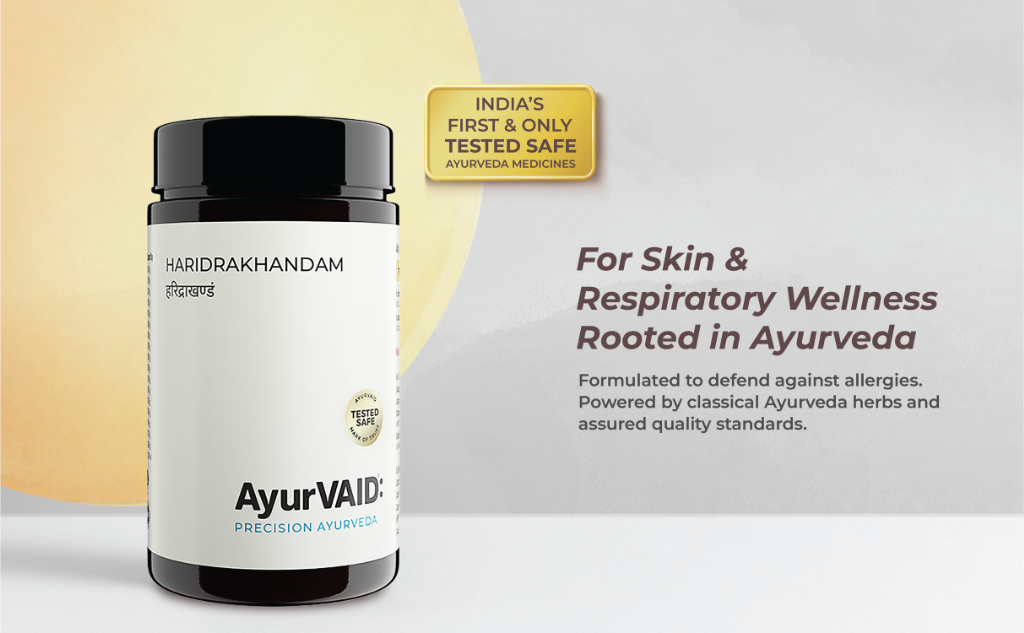
- Avesta AyurVAID Inflammation & Immunity Aid is a bioactive beverage enriched with AmlaPure® that works to enhance your immune system, reduce inflammation, and support gut health. It helps the body regulate its natural inflammatory response, protects against oxidative stress, and aids in cell rejuvenation. This ultra-pure hydration blend contains no added sugar, preservatives, or artificial colours.
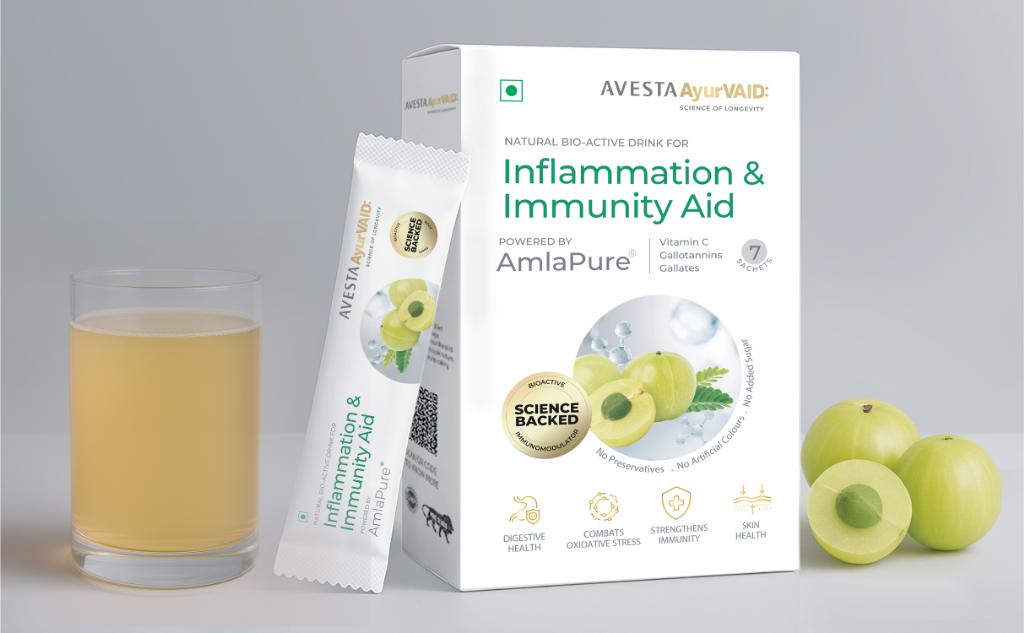
- AyurVAID Nisakathakadi Kashayam is a classical Ayurveda formulation traditionally used to support healthy blood sugar levels and promote balanced metabolism. Infused with Turmeric, Amla, and Triphala, this Kashayam may help regulate high blood sugar experiences and symptoms like frequent urination or fatigue, swelling of the feet, and burning or tingling. As part of India’s first & only TESTED SAFE Ayurveda range, this Kashayam is carefully formulated to meet stringent safety standards for Heavy Metals, Aflatoxins, and Microbial Load, ensuring purity, safety, and therapeutic integrity.
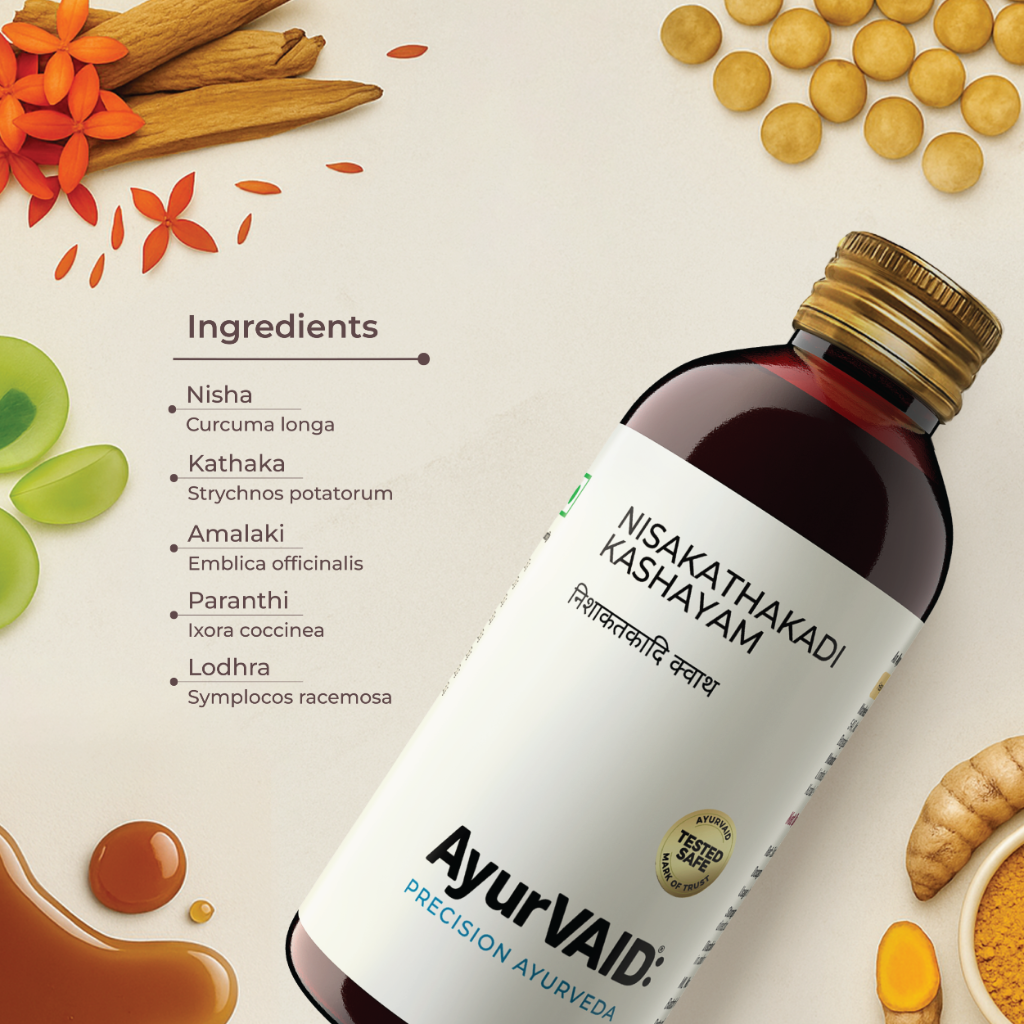
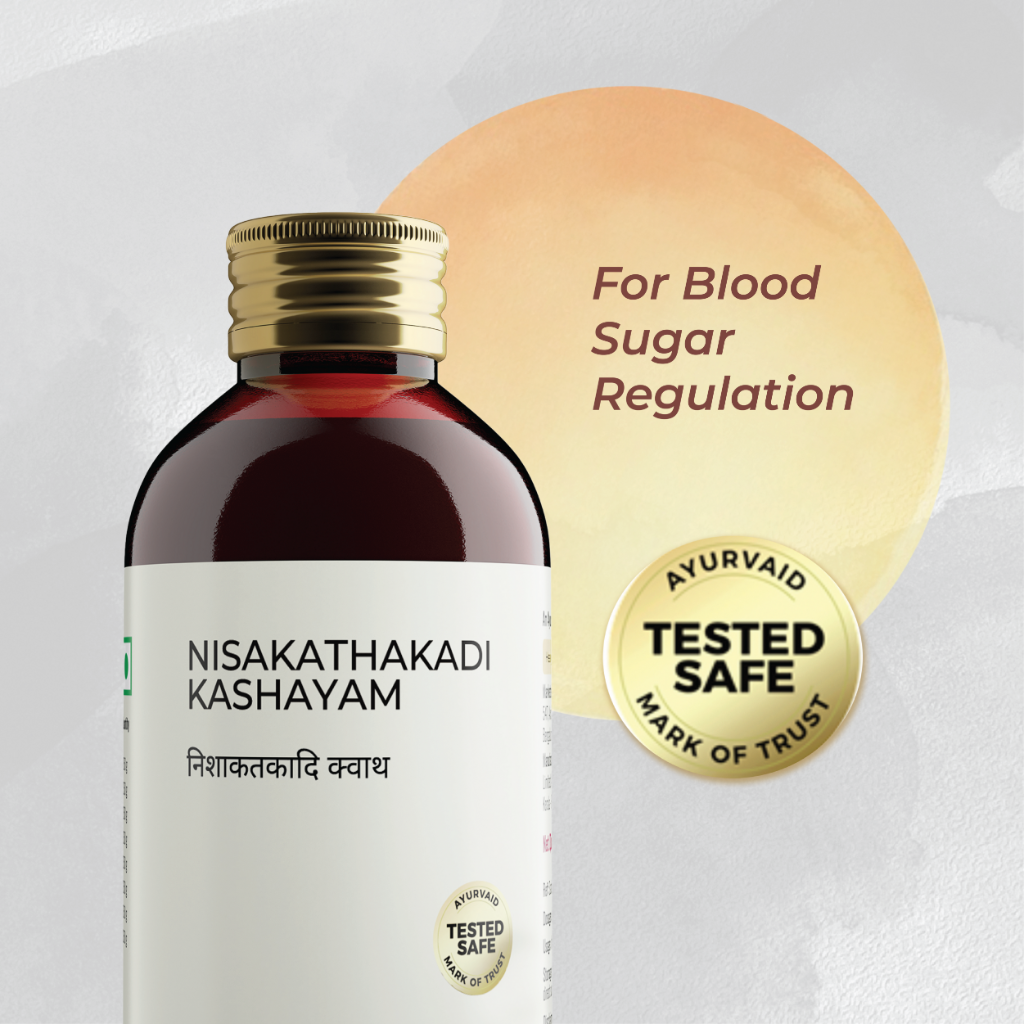
- AyurVAID Chyavanaprasam is a classical Ayurveda formulation designed to strengthen immunity, enhance respiratory health, support digestion, and rejuvenate overall vitality. Enriched with Amla (Emblica officinalis), Ashwagandha, and Giloy, sweetened with sulfate-free Marayoor Jaggery, it provides nourishment of tissue, energy, and stamina while promoting memory, liver, and cardiac functions. Its subtle yet strong Rasayana properties make it safe for daily use for all age groups, supporting immunity, respiratory health, digestion, and overall vitality. Made as part of India’s first and only test SAFE Ayurveda range, AyurVAID Chyavanaprasam is produced under high-quality manufacturing standards guaranteeing its high purity, safety, and therapeutic integrity.
- AyurVAID Triphala Choornam is a classical, time-tested Ayurveda formulation made from the three potent fruits: Amla, Vibhitaki, and Haritaki. Renowned for its mild detoxifying qualities, this choornam promotes healthy digestion, regularity of bowel movements, and internal cleansing without dependence. Typically taken daily to support gut health, this remedy promotes digestive balance, natural detoxification, and overall gut health over the long term. Besides promoting healthy digestion, Thriphala Choornam benefits include eye health, skin clarity, and overall vitality when taken internally or as a gentle eyewash under the supervision of an Ayurveda practitioner.
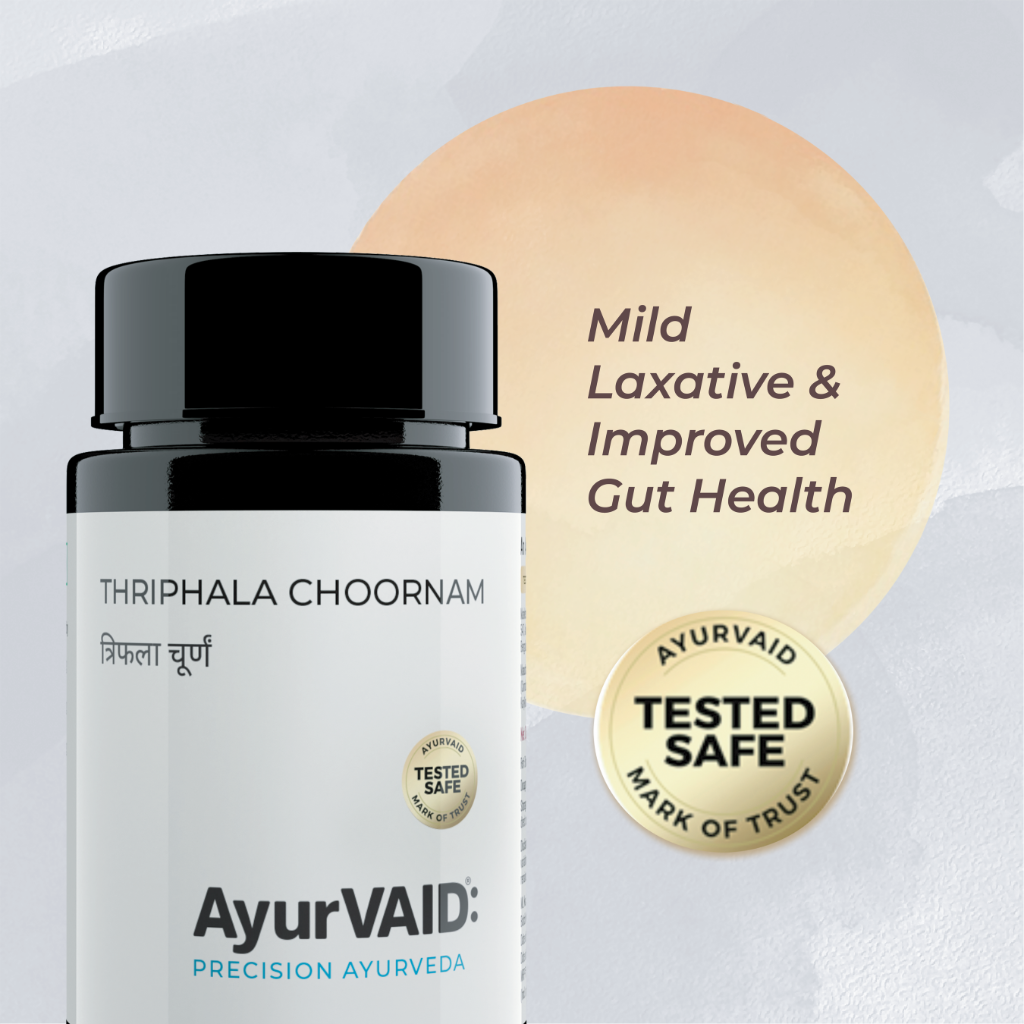
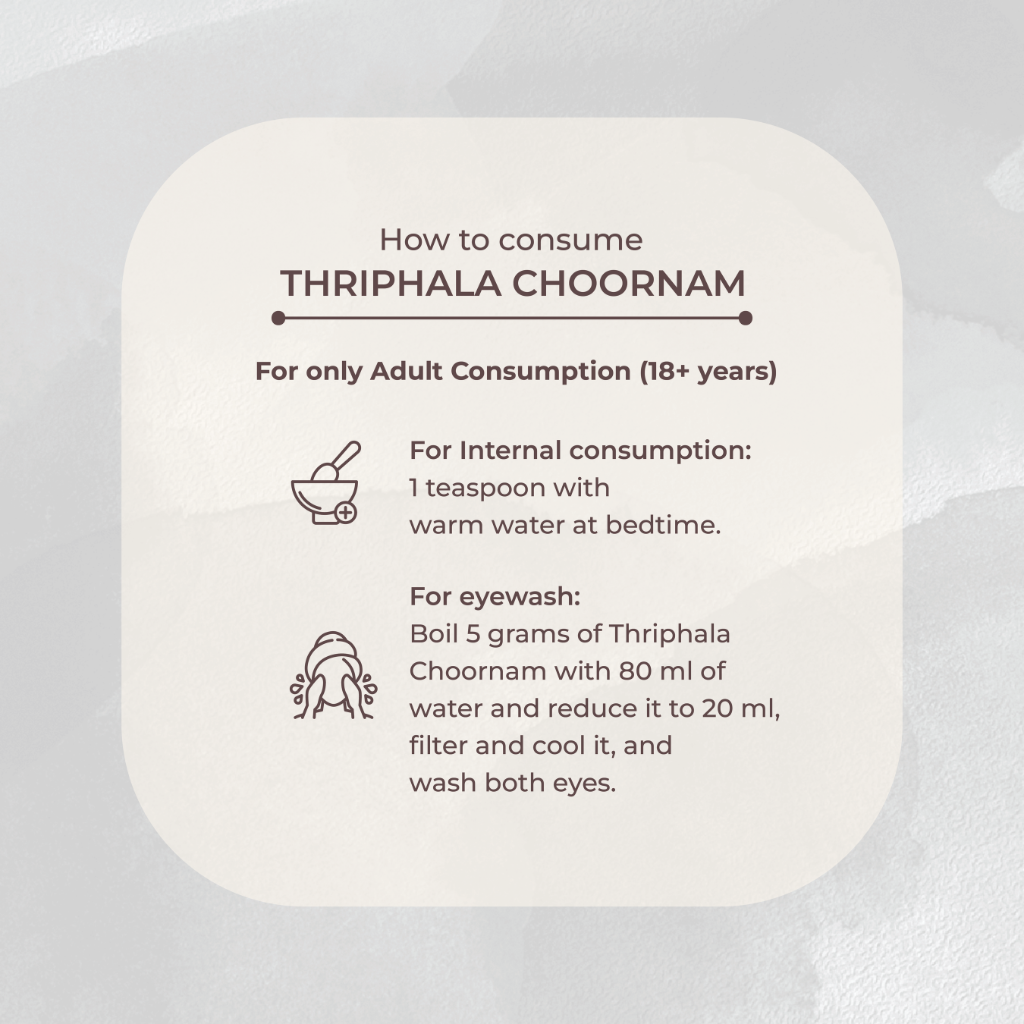
Home Remedies with Amla
- To help with digestion, consume amla with half a teaspoon of rock candy and eat this before your meals.
- Taking one or two fresh ripe fruits or dried amla can help with constipation.
- Mix Amla powder and yoghurt to make a face pack for dry skin. If your skin is oily, mix it with rosewater. After 15 to 20 minutes, wash it off. Do this once a week. This face mask is a natural exfoliant that gets rid of dead skin cells and leaves your skin looking beautiful, clear, and glowing.
Note: Before putting anything on your skin, always do a patch test to see if you have any sensitivities or bad reactions.
- You can use amla powder as a hair pack because it is a natural conditioner that helps get rid of dandruff, hair loss, and premature greying. Mix amla powder with water and put it on your scalp and hair strands. After 5 minutes, wash it off. If you have sinusitis or are susceptible to colds, stay away from it.
- One of the best amla fruit benefits is that it regulates the release of insulin, preventing post-meal sugar spikes. Consuming amla with turmeric powder can help in balancing blood sugar levels.
Note: Even though amla contains blood sugar-regulating effects, it does not treat symptoms of diabetes, and should be considered only a supplement to orthodox medicine. Before consuming amla, speak with your healthcare practitioner, especially if using blood-sugar-lowering medications, because amla could amplify the efficacy of that medication and cause hypoglycemia.
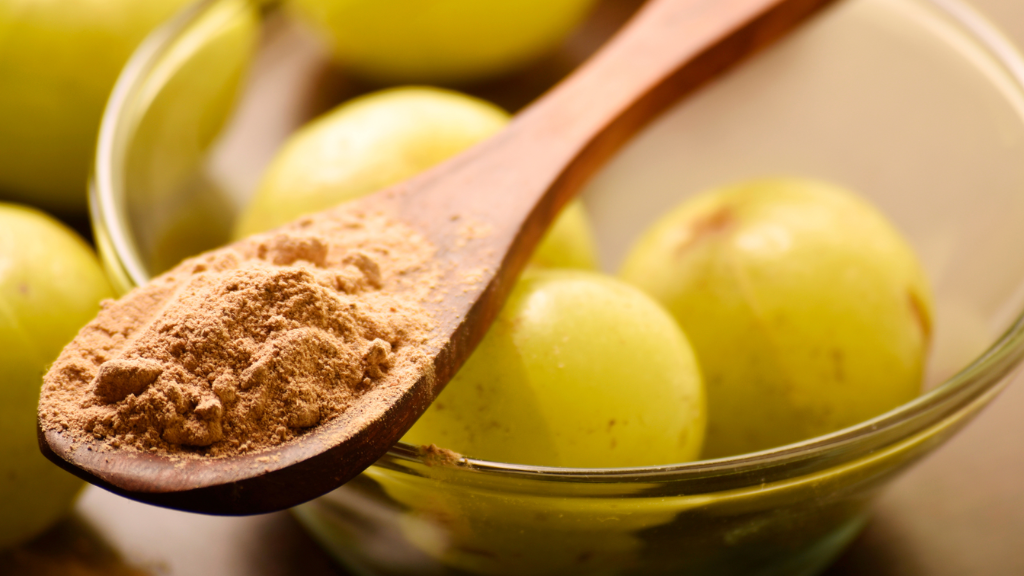
Precautions
- properties, so it should be avoided by those having bleeding disorders or by anyone scheduled for surgery within the next two weeks.
- As amla can lower blood sugar levels, it should be avoided in those on anti diabetic medications without consulting a doctor.
- Excessive consumption might cause skin dryness, stomach upset, or diarrhoea.Amla can thin blood and interrupt normal blood clotting owing to its antiplatelet






